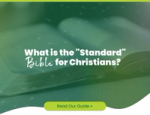Sharia finance and Christianity
Simon Cross
As Christians debate the ethics of finance and investment, should we be looking to the Sharia compliant Islamic banking sector for guidance? We've learned a lot from Islamic art, architecture, literature and science, but what about the Islamic way with money?
There are now a number of Islamic financial institutions in the UK, catering for the needs of Muslims, who have strict controls over what they can and cannot do in terms of finance.
The basis for all Islamic finance lies in the principles of the Sharia, or Islamic Law, which is taken from the Qur'an and from the example of the Islamic Prophet Muhammad.
The principle and most obvious difference between Islamic and ‘conventional’ banking is the need for the absence of interest.
Samir Alamad, Senior Manager, Sharia Compliance and Product Development, Islamic Bank of Britain PLC explained that as interest is gained by the ‘effortless’ lending of money, it is not allowed under Islamic law.
He said: "Islamic banking operates without interest, which is not permitted in Islam, as money in itself is not considered to have intrinsic value.
“As interest is income generated from lending money, it is seen as effortless return. Instead money must be used in a productive way and wealth can only be generated through legitimate trade and investment, which involves an element of risk.”
But this in itself does not rule out the prospect of investment in businesses or ventures which are of dubious ethical quality. However, another key part of Islamic finance is that profit may not be made from businesses which are considered unlawful under Sharia. These include gambling, pornography, tobacco and so on.
Savers with Islamic banks are able to grow their money though, for example by means of an ‘agency agreement’ known as Wakala, which means the bank can invest money acting as an agent on behalf of their clients.
If the (Sharia compliant) business with which the money is invested is profitable, then the deposit holder as the investor is able to earn money on their investment.
The Islamic banks closely monitor the performance of their investments on a daily basis, in order to try and ensure that customers receive the projected target, or ‘expected’ profit rate.
Samir Alamad added: “ The whole premise of Islamic banking is to provide a way for society to conduct its finances in a way that is ethical and socially responsible. Trade, entrepreneurship and risk-sharing are encouraged and these are the financial principles that underpin Islamic finance and the products offered by IBB.”
Latest Blogs

Gifts
Finding Your Symbol of Faith: A Guide to Christian Cross Necklaces
Looking for the perfect symbol of faith? Explore our guide to Christian cross necklaces, from rustic wooden designs and sturdy men's chains to elegant silver pendants.

Gifts
The Best Christian Gifts for Under £20
Looking for a meaningful gift that won't break the bank? Explore our guide to the best Christian gifts under £20, from inspiring journals to beautiful home decor.

Gift Guide
15 Confirmation Gift Ideas for Boys and Girls
Celebrating a confirmation? Discover 15 meaningful gift ideas for boys and girls, from youth Bibles and jewellery to inspiring journals and keepsakes.

Bible
30+ Powerful Quotes About the Bible (For Inspiration in 2026)
Looking for inspiration? Discover a curated collection of the most powerful quotes about the Bible, from famous historical figures to modern theologians and Scripture itself.

Bibles
What is the "Standard" Bible for Christians?
Is there an "official" Bible that all Christians use? We explain the difference between the NIV, KJV, and ESV, and help you find the standard text for your church or personal reading.

Bible
"I Keep Failing to Read the Bible" – 5 Tips to Make the Habit Stick
Do you start a Bible reading plan only to quit a few weeks later? Stop the cycle of guilt. Here are 5 psychological tips and practical changes to help you build a Bible habit that actually lasts in 2026.
